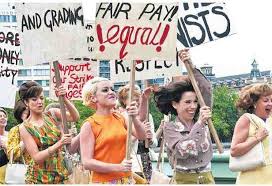Glasgow MSPs and MPs
A reader from Glasgow has been in touch to say that her local MP has not responded to her email about the equal pay dispute with Glasgow City Council.
Now I'm surprised and a little shocked by that I have to admit, so I've asked the reader to let me know the identity of the MP in case others are having a similar problem.
I've not had a reply to an email I sent my MP ....hmmmm
 🤔
🤔N
Because I would have expected every Glasgow politician - councillors, MPs and MSPs - to get fully behind their local constituents on the principle of 'equal pay for work of equal value'.
That's not a lot to ask, surely.
Glasgow's MSPs and MPs (08/09/17)
If you ask me, Glasgow MSPs and MPs have not been very vocal or visible in standing up for the rights of their local constituents in the fight for equal pay over the past 10 years, but let's hope things are about to change for the better.
So here is a list of the MSPs and MPs whose constituencies lie within the boundaries of Glasgow City Council - engaging with local politicians and asking them where they stand will help to bring the fight for equal pay to a speedy and successful conclusion.
Here's a handy link names all of the various Glasgow constituencies for easy reference: https://www.glasgow.gov.uk/index.aspx?articleid=17759
I contacted all of these MSPs and MPs yesterday, so they are all up to speed on the latest developments and since the local elections in May 2017 Labour has, of course, lost political control of Glasgow City Council to the SNP.
The MSPs are all the same, but there are two changes in the MP list with David Linden replacing Natalie McGarry in Glasgow East and Paul Sweeney replacing Anne McLaughlin in Glasgow North East.
Contact details for Glasgow councillors can be found via the following link to the City Council's web site: https://www.glasgow.gov.uk/index.aspx?articleid=17565
Glasgow MSPs (Scottish Parliament)
Glasgow MPs (Westminster Parliament)
David.Linden.mp@parliament.uk
Paul.Sweeney.mp@parliament.uk
Carol.Monaghan.mp@parliament.uk
Glasgow - Breaking News!
Here's a letter I sent earlier today to the leader of Glasgow City Council, Cllr Susan Aitken.
We are now at a critical point in the fight for equal pay with Glasgow City Council because the new SNP led administration, while promising a new approach, has yet to deliver on its commitment to 'openness and transparency' as far as the WPBR pay scheme is concerned.
Dear Councillor Aitken
Glasgow's Secret Pay Arrangements
I enclose for your information a copy of the City Council's response to my latest FoI request regarding the operation of the Employee Development Commitment (EDC) scheme which, as you know, guaranteed the future earnings of former bonus earning jobs.
As you know, I believe the provision of this information is the key to resolving Glasgow's outstanding equal pay issues. As Lady Norris said at the Court of Session hearing the council clearly “looked after” the men well beyond the protection period, which means it is crucial to know precisely how they were helped and what affect this had on their pay. The view of A4ES is that the women were entitled to the same help as the men. What happened to the men is the baseline for future settlement discussions.
I understood the SNP Group to be committed to a new approach to resolving the outstanding equal pay issues in Glasgow, but whatever is happening behind the scenes, I have to tell you this is not having a noticeable effect on the behaviour of the Council's senior officials.
If senior officials in Scotland's largest council can't or won't get their act together, maybe the solution in Glasgow is to bring in the Accounts Commission to uncover what has really been going on for the past 10 years.
Kind regards
Mark Irvine
Equal Pay - 'Decade Long Failure' (07/09/17)
The Herald's Tom Gordon reports on a special investigation by the Accounts Commission which concludes that a 'decade long failure of leadership by local and central government' is responsible for the continuing debacle over equal pay.
Glasgow City Council, Scotland's largest, has been fighting a desperate battle against equal pay for the past ten years and its pay arrangements are still shrouded in secrecy - as opposed to being 'open, honest and transparent'.
The Court of Session recently judged Glasgow's revised pay arrangements and its in-house job evaluation scheme (JES), introduced in 2007 to be 'unfit for purpose' - as a result the number of equal pay claims in Glasgow is growing by the day.
If Scotland's largest council can't or won't get its act together, maybe the solution in Glasgow is to send in the Accounts Commission to uncover what has really been going on for the past 10 years.
http://www.heraldscotland.com/news/15519420.Watchdog_report_exposes_litany_of_failures_behind___1bn_equal_pay_bill/
By Tom Gordon - Scottish Political Editor, The Herald
Glasgow City Chambers
A DECADE long failure of leadership by central and local government has left taxpayers with a bill of more than £1billion for equal pay claims from female council staff, it has emerged.
In a damning study of politicians stalling and ducking responsibilities, the Accounts Commission said around £750m had been spent settling pay claims since 2004.
However a further 27,000 claims are still live, including a recent one from more than 6000 workers in Glasgow which could cost the city £500m, pushing the final bill far higher.
The watchdog blamed “a lack of collective national leadership to overcome challenges and address equal pay issues in a timely way”, with ministers failing to give councils extra funds to help stave off challenges, and authorities in denial about the scale of the problem.
Male-dominated trade unions protecting the higher wages of male workers, often through spurious bonuses, were also a factor.
In order to fix pay anomalies a UK-wide deal, the Single Status Agreement, was established in 1999 to unify pay structures.
Councils were given until 2004 to carry out job evaluations so that women in roles such as caring, cleaning and catering were no longer paid less than men doing equivalent work such as gardening, gravedigging or bin collection.
However only one council met the deadline, and it was not until 2010 that all of Scotland’s councils had single status in place.
Without funds from central government to harmonise pay scales properly, councils failed to make the issue a priority and skimped on deals, sometimes adding to the discrimination by allowing bad practices to continue in order to avoid industrial action.
They also paid 50,000 women £232m in compromise deals to give up claims to back pay.
There were “often of a relatively low value” compared to what they were due.
Partly because many offers were inadequate, and partly because no-win no-fee lawyers became involved, around 70,500 equal pay claims were lodged against councils after 2004.
Of these around 27,000 are outstanding, and new claims are still being brought.
Highlighting the painfully slow progress, the report said: “Thousands of claims currently in the system in Scotland have been live for over a decade.”
The watchdog also complained it had faced “considerable difficulty” due to a lack of good quality data relating to the implementation of equal pay.
It recommended that councils ensure all pay arrangements are fair and transparent.
Commission member Pauline Weetman said: "Equal pay is an incredibly important issue and a legal duty for Scotland's councils to eliminate decades of inequality. However, implementation of equal pay has been a substantial challenge for local government."
The council umbrella body Cosla said it welcomed the report’s recognition that councils had faced “complex judicial processes and huge costs” as they tried to deliver equal pay.
“Councils have endeavoured to settle all legitimate claims as quickly as possible,” it said.
Equal pay campaigner Mark Irvine, who has helped many female workers bring claims against council bosses, said the issue remained a “national disgrace”.
He said: “The report hits the nail on the head. There was an agreement to end discrimination in 1999 and that it’s still happening in 2017 is a terrible indictment of Cosla. Major councils ganged up to prevent low-paid women getting what they were promised 20 years ago.”
The public sector union Unison said the report’s findings were “shocking”.
Scotland regional manager Peter Hunter said: “This study demonstrates the cost of delay and dereliction of duty. If this report compels those remaining councils to resolve outstanding claims... the Accounts Commission will have played a vital role.”
Scottish LibDem leader Willie Rennie added: “This is a complex process but far too many people, mainly women in low paid jobs, are waiting far too long for the money they are due.
"The Scottish Government needs to work with councils to seek a speedier solution.”
“It is time for this legacy of inequality to be resolved.”
'Nuanced Legal Issues', My Arse (07/09/17)
By the way, have you ever heard a more pathetic comment from anyone on such a major public policy issue than the COSLA spokesperson, Cllr Gail Macgregor, who is reported as saying:
"As employers, councils take their responsibilities to achieve equal pay very seriously, and we are frustrated that there remains a high number of claims outstanding.
"This is in large part down to complex and nuanced legal issues which can frustrate the process and act as barriers to quicker outcomes."
Now this is complete baloney, of course, because if Scotland's councils had implemented the 1999 Single Status (Equal Pay) Agreement as intended there would have been no reason for all tens of thousands of equal pay claims to be lodged over the past 12 years.
Nuanced legal issues, my arse.
http://www.bbc.com/news/uk-scotland-scotland-politics-41174490
BBC Scotland politics

Image copyright - PA Image caption - The report says measures previously adopted by councils kept men's salaries higher
Councils across Scotland have still to settle more than a third of all equal pay claims 13 years after the deadline for new rules was set, a spending watchdog has found.
The Accounts Commission said about £750m was spent settling claims since 2004 but nearly 27,000 were still live.
Councils were ordered in 1999 to "harmonise pay for employees and address historic inequalities".
But all but one of the 32 local authorities missed the 2004 deadline.
Responding to the report, the Convention of Scottish Local Authorities (Cosla) said councils "take their responsibilities to achieve equal pay very seriously".
It added that the findings recognised "the complex judicial processes and huge costs that councils have faced".
It took 11 years - twice as long as planned - for all councils to implement the equal pay agreement, which was finally completed in 2010.
The commission found progress was slowed by funding problems as councils received no extra money for the new pay scheme.
Councils across Scotland have still to settle more than a third of all equal pay claims 13 years after the deadline for new rules was set, a spending watchdog has found.
The Accounts Commission said about £750m was spent settling claims since 2004 but nearly 27,000 were still live.
Councils were ordered in 1999 to "harmonise pay for employees and address historic inequalities".
But all but one of the 32 local authorities missed the 2004 deadline.
Responding to the report, the Convention of Scottish Local Authorities (Cosla) said councils "take their responsibilities to achieve equal pay very seriously".
It added that the findings recognised "the complex judicial processes and huge costs that councils have faced".
It took 11 years - twice as long as planned - for all councils to implement the equal pay agreement, which was finally completed in 2010.
The commission found progress was slowed by funding problems as councils received no extra money for the new pay scheme.
'Lack of national leadership'
Some approaches taken to save costs and avoid industrial action, such as protecting pay and bonuses for some roles, were also found to be discriminatory.
The report states: "Ultimately the measures councils adopted kept men's salaries higher than women performing equivalent roles."
The commission also found a "lack of collective national leadership to overcome the challenges and address equal pay issues in a timely way".
Between 2004 and 30 September 2016, some 70,453 equal pay claims were lodged against councils. Payouts, including compensation agreements and legal fees, totalled about £750m.
At the end of September last year, 26,912 equal pay claims lodged with the Employment Tribunal Service remained live - representing about a third of all claims since 2004.
Of these, nine out 10 are from women, and thousands of cases have been live for more than a decade.
The commission stressed that workers could potentially still make new claims against councils.

Image copyright - GETTY IMAGES
- Most claims still live (National average - 37.4%):
- North Ayrshire - 95%
- East Dunbartonshire - 90%
- Falkirk - 80%
- Most claims lodged:
- Glasgow City Council - 22,730
- North Lanarkshire - 10,480
- Edinburgh City Council - 6,163
- Orkney had the lowest at 14
- Most paid out:
- North Lanarkshire - £129.9m
- Glasgow - £91.4m
- Edinburgh - £87.5m
- Orkney was lowest at £1.8m
Commission member Pauline Weetman said: "Equal pay is both an incredibly important issue and a legal duty for Scotland's councils to eliminate decades of inequality.
"However, implementation of equal pay has been a substantial challenge for local government.
"Councils need to be confident that pay equality is embedded in how they operate.
"It's critical that officers ensure that they're doing all they can to fulfil their duties in relation to equal pay and publicly report this work, and that elected members continue to scrutinise and challenge their progress."
'Nuanced legal issues'
Councillor Gail Macgregor, resources spokeswoman for Cosla, which represents many of Scotland's councils, welcomed the report.
She said it "recognises the complex judicial processes and huge costs that councils have faced as they have worked hard to meet their equal pay obligations".
Ms Macgregor added: "As employers, councils take their responsibilities to achieve equal pay very seriously, and we are frustrated that there remains a high number of claims outstanding.
"This is in large part down to complex and nuanced legal issues which can frustrate the process and act as barriers to quicker outcomes.
"Councils have endeavoured to settle all legitimate claims as quickly as possible. It is worth nothing that cases can remain 'live' in the Employment Tribunal system even when settled and we have no control over when these are taken down.
"Also, many other remaining cases are 'class actions' where the settling of a single test case will resolve a larger number of cases in one go."

